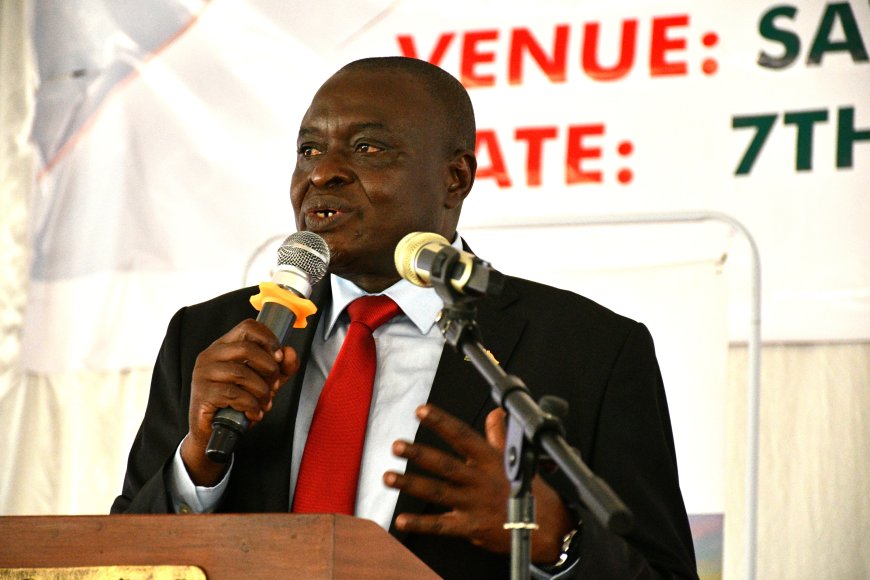Government to establish a milk stabilization fund

Kiambu,
Thursday, November 9, 2023
KNA by Wangari Ndirangu
The government has undertaken an ambitious Sh2.5 billion modernization and expansion programme for the New KCC plant and equipment.
Cooperative and Micro and Small Enterprise Cabinet Secretary Simon Chelugui says the move will increase the factory’s processing capacity from the current 300,000 to an impressive 800,000 liters per day.
Speaking during a Cooperative Leaders forum in Naivasha, Chelugui noted that the Bottom Up Economic Transformation Agenda (BETA) recognized the dairy subsector as a pivotal value chain due to its substantial contributions to the national and rural economy.
The CS said the government plans to establish a milk price-stabilization fund, which will be executed through New KCC, representing further interventions aimed at ensuring a stable and prosperous dairy subsector.
“The State will spend Sh3 billion for stabilization of milk price in the wake of a glut that is expected in the market due to favourable weather that has spurred production on farms,” he said.
The funds, he added, will be used to mop up excess milk from farmers and convert it to long-life products to be stored in the Strategic Food Reserve.
Chelugui said the money will also be channeled through New KCC, which will be instrumental in stabilizing milk prices in the country and enable farmers to earn good returns, even with an increase in supply.
“Processors are now grappling with a high supply of milk from farmers due to the glut that has gone beyond the intake capacity of the factories, but the funds will be used to stabilize the price of the commodity in the market and ensure that we collect all the milk from farmers,” said the CS.
He added, “This is an intervention the government is taking to absorb extra milk. Because of the good weather we are enjoying now, we have excess milk production, many processors have abandoned the farmers, and therefore the government is taking up this and processing for future use.”
Kenya, he noted has experiencing good rains since August and the excess milk will be stored in Strategic Food Reserves (SFR) as powdered milk for future use and urged other private processors to also buy more milk from farmers for conversion into powder.
Chelugui noted that the government is considering the provision of milk coolers to dairy farmers through their cooperatives under the auspices of the New KCC.
This comes at a time when President William Ruto has directed all processors to increase the price of milk from the current Sh42 to Sh50.
Ruto said they have agreed with the processors to review milk prices upward in the coming days, all aimed at benefiting the farmers.
Currently, processors are remitting up to Ksh40 per liter of milk delivered by farmers through various cooperative societies.
The President convened a meeting of dairy stakeholders last month to address various challenges confronting the sector.
The boost comes as the dairy subsector faces significant challenges, including high breeding costs, disease prevalence, insufficient extension services, expensive animal feed, limited value addition, post-harvest losses, and low market access.
The New KCC has been tasked with the mandate to stabilize both producer and consumer milk prices by efficiently managing milk surpluses during the glut period by converting excess milk into a strategic food reserve in the form of dry milk powder, which can be released back into the market during dry seasons.
Daniel Marube, The Executive Director and CEO of Cooperative Alliance of Kenya, which is the APEX organization that brings all the registered cooperatives in Kenya together said Kenya has the potential to grow the dairy milk production up to four million liters per day.
We are now doing about 1.5 million liters per year per day. With the government promising to support the dairy farmers with the coolers, we are educating our members on how we can improve the quality and quantity of milk through upgrading our animals so that we can be able to produce more.
The biggest challenge, Marube noted, has been on the animal feed, and are hoping that by working with the government they shall have some subsidy that will see farmers get affordable animal feed.
On his part, Ambrose Koech from K-Piller Sacco in Bomet County called on the government to also try and give subsidies on animal feeds just like the way they give fertilizer to farmers on crops
“We are really worried. The government should come in and subsidize the cost of feed so that at least the farmers will be able to make some money.
Again, the sale of milk has been left to hawkers mainly and we are hoping that the government is going to streamline the price of milk so that at least the milk cooling plants that we have can be the only collection point for the milk,” he said.
Most farmers, Koech said, usually have the milk but due to middlemen coming to collect the milk from the farmers in their homes, they almost dictate the prices and they get the milk at the lowest of even Sh35 per litre.
“We thank the Cooperatives CS for the many reforms he has said and we are now seeing light at the end of the tunnel, but we want the action to be done now as soon as today,” said Koech.
The Cooperative Leaders meeting brought together the government, and the cooperative leaders to evaluate the performance of the cooperative sector in the previous financial year.
Courtesy; KNA
What's Your Reaction?



































































































































































































































































































